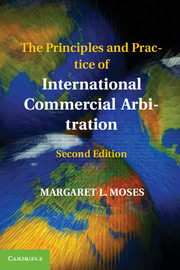Book contents
- Frontmatter
- Contents
- Preface to the Second Edition
- Foreword to the First Edition
- Chapter One Introduction to International Commercial Arbitration
- Chapter Two The Arbitration Agreement
- Chapter Three Drafting the Arbitration Agreement
- Chapter Four Applicable Laws and Rules
- Chapter Five Judicial Assistance for Arbitration
- Chapter Six The Tribunal
- Chapter Seven The Arbitral Proceedings
- Chapter Eight The Award
- Chapter Nine Attempts to Set Aside an Award
- Chapter Ten Enforcement of the Award
- Chapter Eleven Investment Arbitration
- Appendix A The United Nations Convention on the Recognition and Enforcement of Foreign Arbitral Awards (The New York Convention) (1958)
- Appendix B UNCITRAL Model Law on International Commercial Arbitration (original 1985 version)
- Appendix C Revised Articles of the UNCITRAL Model Law on International Commercial Arbitration (2006)
- Appendix D UNCITRAL Recommendation Regarding the Interpretation of Article II, Paragraph 2, and Article VII, Paragraph 1, of the New York Convention
- Appendix E IBA Rules on the Taking of Evidence in International Arbitration
- Appendix F IBA Rules of Ethics for International Arbitrators 1987
- Appendix G IBA Guidelines on Conflicts of Interest in International Arbitration
- Appendix H The AAA–ABA Code of Ethics for Arbitrators in Commercial Disputes
- Appendix I Model Clauses
- Appendix J Useful Arbitration Websites
- Index
- References
Chapter Two - The Arbitration Agreement
Published online by Cambridge University Press: 05 June 2012
- Frontmatter
- Contents
- Preface to the Second Edition
- Foreword to the First Edition
- Chapter One Introduction to International Commercial Arbitration
- Chapter Two The Arbitration Agreement
- Chapter Three Drafting the Arbitration Agreement
- Chapter Four Applicable Laws and Rules
- Chapter Five Judicial Assistance for Arbitration
- Chapter Six The Tribunal
- Chapter Seven The Arbitral Proceedings
- Chapter Eight The Award
- Chapter Nine Attempts to Set Aside an Award
- Chapter Ten Enforcement of the Award
- Chapter Eleven Investment Arbitration
- Appendix A The United Nations Convention on the Recognition and Enforcement of Foreign Arbitral Awards (The New York Convention) (1958)
- Appendix B UNCITRAL Model Law on International Commercial Arbitration (original 1985 version)
- Appendix C Revised Articles of the UNCITRAL Model Law on International Commercial Arbitration (2006)
- Appendix D UNCITRAL Recommendation Regarding the Interpretation of Article II, Paragraph 2, and Article VII, Paragraph 1, of the New York Convention
- Appendix E IBA Rules on the Taking of Evidence in International Arbitration
- Appendix F IBA Rules of Ethics for International Arbitrators 1987
- Appendix G IBA Guidelines on Conflicts of Interest in International Arbitration
- Appendix H The AAA–ABA Code of Ethics for Arbitrators in Commercial Disputes
- Appendix I Model Clauses
- Appendix J Useful Arbitration Websites
- Index
- References
Summary
FUNCTION AND PURPOSE
When parties agree to arbitrate their disputes, they give up the right to have those disputes decided by a national court. Instead, they agree that their disputes will be resolved privately, outside any court system. The arbitration agreement thus constitutes the relinquishment of an important right – to have the dispute resolved judicially – and creates other rights. The rights it creates are the rights to establish the process for resolving the dispute. In their arbitration agreement, the parties can select the rules that will govern the procedure, the location of the arbitration, the language of the arbitration, the law governing the arbitration, and frequently, the decision makers, whom the parties may choose because of their particular expertise in the subject matter of the parties’ dispute. The parties’ arbitration agreement gives the arbitrators the power to decide the dispute and defines the scope of that power. In essence, the parties create their own private system of justice.
Arbitration Clauses and Submission Agreements
The parties’ arbitration agreement is frequently contained in a clause or clauses that are embedded in the parties’ commercial contract. The agreement to arbitrate is thus entered into before any dispute has arisen, and is intended to provide a method of resolution in the event that a dispute does arise. However, if there is no arbitration clause in the parties’ contract, and a dispute arises, at that time the parties can nonetheless enter into an agreement to arbitrate, if both sides agree. Such an agreement is generally referred to as a submission agreement. However, submission agreements are much less common than arbitration clauses in contracts, because once a dispute arises, the parties often cannot agree on anything. For that reason, it is generally better for the parties to agree to arbitrate at the beginning of the relationship, when they are still on good terms.
- Type
- Chapter
- Information
- Publisher: Cambridge University PressPrint publication year: 2012



